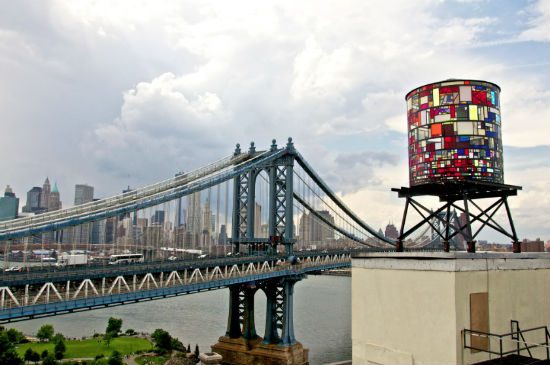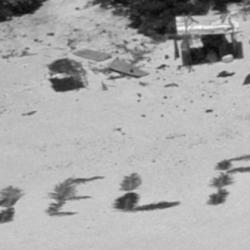“It’s about family,” the Very Nice man said, repeatedly. The people of his community have “care and concern for family.”
The first four or five times he said this it didn’t seem remarkable because, after all, people caring about their families is pretty much the definition of unremarkable. It’s like someone describing their community by telling you that, “Well, ’round these parts, folks like us tend to be bipedal, and we like to ingest our food orally.”
But gradually, I began to realize what the Very Nice man was actually saying. “You have to understand that family is important to people here.” This, he was suggesting, was something unusual about the people of his community — something he assumed would be strange and exotic and difficult to understand for the rest of us.
And then he said it explicitly, describing this concern for family as a “peculiar virtue” of his community.
Aha. It turns out this Very Nice man and his Very Nice community have some not-at-all nice — and very wrong — ideas about, well, everyone else who isn’t them. Because what he’s really telling us, over and over and over, isn’t that he and his community care about their families. What he’s really telling us is that they imagine other people elsewhere do not care about their families.
This isn’t an expression of local pride, but a slanderous accusation against everyone else who isn’t from around here. It’s not a celebration of the virtues of small-town community, but the prejudice that comes from parochial ignorance mixed with a willingness — and an eagerness — to presume the worst about everyone you don’t already know.
It’s similar to the weird white tribalism you can hear in dozens of Country songs. This has become a sub-genre of Country & Southern music in recent years, and the whole category is based on the same dynamic described above — a celebration of universal human values that winds up denying the humanity of others by claiming those values as the unique and peculiar property of a single community.
Consider for example Rodney Atkins’ song “It’s America” — most of which sounds like it was written in the hopes of being used in a pickup truck ad. The chorus is a bit corny, but it’s expansive and inclusive, and it celebrates good things that are worthy of celebration:
It’s a high school prom, it’s a Springsteen song, it’s a ride in a Chevrolet
It’s a man on the moon and fireflies in June and kids sellin’ lemonade
It’s cities and farms, it’s open arms, one nation under God
It’s America
But something odd happens in Atkins’ second verse:
Later on when I got home, I flipped the TV on
I saw a little town that some big twister tore apart
And people came from miles around just to help their neighbors out
And I was thinkin’ to myself I’m so glad that I live in America
This is, indeed, a Good Thing about the people of this country and a legitimate and accurate reason that one ought to be glad to live in America. People here really will come from miles around just to help their neighbors out after a natural disaster tears apart some neighboring community. And that is, truly, a beautiful thing.
But it’s weirdly wrong that Atkins seems to think this good and beautiful thing is as uniquely and exceptionally American as the moon landing.* It seems like he imagines that Canadians don’t do the very same thing when disaster hits some town in that country. Or as though no one would think of coming from miles around just to help their neighbors out in Mexico, or Scotland, or Thailand, or Russia, or Iran, or Indonesia.
And once you realize that this is what Atkins is also saying, then suddenly what had been a celebration of something lovely turns into a nasty, mean-spirited, ignorant slur of everyone else.
This is why these songs come across less as celebrations of local pride than as expressions of suspicion and hostility to anyone who isn’t from “Where I Come From.” That’s the name of an Alan Jackson song. And of a slightly different Montgomery Gentry song. And of a slightly different Mac McAnally song. And that’s the gist of a slightly differently named song from Luke Bryan.

These songs all seem to wobble back and forth between a (sometimes clichéd) celebration of a (real or imagined) small community and a series of implied accusations and condemnations of everywhere that isn’t that place. They start out innocently enough, affirming something like what President Dwight D. Eisenhower described as: “the great and priceless privilege of being raised in a small town … the simple honesty, the neighborliness, the integrity.” They attempt to sketch the kind of close-knit small-town community where, as President Lyndon B. Johnson’s dad put it, others “know when you’re sick, and care when you die.” And that’s all good, even if — as Ike also admitted — it tends to fade into “nostalgic memories” that may exaggerate those virtues while blurring away any faults.
But problems arise when these great and priceless things are imagined to be “peculiar virtues” — the sole, exceptional property of the residents of those small towns. And when they assume and reinforce the assumption that everywhere else and everyone else embodies the opposite of the great and priceless things they attribute solely to Where I Come From.
The Montgomery & Gentry song begins with a defiant statement that makes its suspicion and hostility toward everyone else explicit: “Don’t you dare go runnin’ down my little town where I grew up / And I won’t cuss your city lights.”
That’s the undergirding assumption of this genre of songs: You folks don’t — and can’t — understand us because you’re fundamentally unlike us. The premise is that city folk know nothing about small-town folk, and yet that somehow small-town folk know everything about city folk. They sing:
If you ain’t ever took a ride around
And cruised right through the heart of my town
Anything you say would be a lie
And yet they assume that the same thing doesn’t apply to them — that they are able to speak with certainty about the values and character of those people over there, the ones who live under those city lights, without ever taking a ride around those places and getting to know those people. (And one gets the sense that by “those people,” they often mean, you know, those people.) They already “know” all they care to know about big city people, which is: 1) city folk spend all their time “runnin’ down” little towns; and 2) city people are presumed to be the opposite in every way of small-town/country people.
And thus, as a corollary of No. 2, if small-town, country folk believe in honesty and hard work, and if they love their family, their country, and their God, then it follows logically that those people — those big-city people — do not believe in honesty and hard work, and that they do not love their family, their country and their God.**
Some of these songs about “Where I Come From” can be sweet and evocative, rather than defiantly hostile. The good ones seem to want to show you what those places were like — to welcome you there with a genuine hospitality rather than just running through a checklist of tribal totems and performative “authenticity.” They say, “welcome, come on down” rather than “Keep out: You aren’t one of us.”
For example, I love the central image in Scotty McCreery’s “Water Tower Town.” That’s a terrific shorthand description for the kind of small, rural American community the song wants to celebrate, and it pays off again in the delightful double meaning of the last lines of the chorus:
You can see who loves who for miles around
In a water tower town.
That’s such an evocative and endearing detail that, hearing it, I’m willing to at least briefly set aside questions about the Venn Diagram between Water Tower Towns and Sundown Towns. It mitigates some of the other aspects of that song that shade more into the kind of parochial prejudice that ruins the hospitality it wants to display. “Where your friend’s a friend and your word’s your word,” McCreery sings, and, “workin’ hard and livin’ right is the only life we know.” And there the song seems to shift from saying something truthful and real about folks in his town to saying something untruthful and unreal about everyone else.
The difference, I think, has something to do with what James Joyce was getting at when he said “in the particular is contained the universal.” That’s why he wrote about Dublin. That was where he came from, and that was the place he knew, but he believed that the particularities of Dublin were accessible and recognizable to everyone because people are people, no matter where you go and wherever it is that they come from.
The particular detail of a water tower graffiti’d with someone’s declaration of love is specific enough that it evokes its place and tells us something about that place and the people who live there. That makes us smile because — even though we’re not those people and we’re not from there — we can recognize what that’s getting at and thereby recognize the shared humanity of people there and people everywhere else. The particular contains the universal.
But then we hit those stale platitudes about honesty and hard work, which offer nothing in the way of particularity or specificity. Folks ’round here try to be honest, and we’re loyal to our friends, and we value hard work. Congratulations — you just described almost everyone everywhere. Such vague, universal generalities are bad art and bad storytelling.
But those vague generalities also become morally bad. By claiming these universal human virtues as the exclusive attributes of a particular people in a particular place, the song becomes a lie. It bears false witness against its neighbors.
And when it comes down to it, that’s also what the Very Nice man at the beginning of this post was doing. His talk about “the importance of family” was his attempt to explain why the congregants in his white evangelical church in Wisconsin voted for Donald Trump.***
But that’s not accurate. They did not vote Trump because they love their families and because they value hard work. They did so because they wanted and needed to believe that other people — those people — do not love their families and do not value hard work. They wanted and needed to believe that loving their families and valuing hard work makes them exceptional — better, more deserving, more entitled, and wholly distinct from those people over there who don’t love and value those things.
And when you’re that eager to believe something so nasty and so easily falsifiable about other people, well, I’m not sure you’re actually Very Nice at all.
– – – – – – – – – – – –
* There is a kind of American exceptionalism in what Atkins describes, but that’s due to the tornado, not to the neighborly response. Tornados are not unique to the United States, but they’re far more common here than they are anywhere else on the planet. That’s due to unique geographical and meteorological features of America’s “tornado alley” — the Rockies and the Gulf of Mexico combine to make tornados as American as apple pie and Chevrolet.
It’s Bad Theology and Bad Science to attempt to link natural disasters to human morality, sin or divine providence, but this particular brand of rank stupidity still remains quite popular, particularly among our friends in the religious right. I sometimes wonder what folks like John Piper or Pat Robertson would say if they ever realized that America has 12 times more tornadoes every year than any other country. But I suppose it’d be the same thing they always say — that this must be divine judgment for the national sins of Roe v. Wade, Engel v. Vitale, and, worst of all, Brown v. Board of Education.
** Jackson’s song makes this even more explicit than the Montgomery Gentry tune. He assures his audience that he has, in fact, driven through all those big cities where those people live, and thus has learned all there is to know about them. The narrator of his song is a trucker who’s seen it all, so he’s not just hostile and suspicious toward those people — he knows they’re fundamentally unlike the good and virtuous folk of the good and virtuous places.
It’s a pretty vile piece of work, rendered ridiculous by Jackson’s ignorant bungling of the details. He complains, for example, that one can’t find good old Southern-style “corn bread and chicken” in Detroit. “It ain’t like mama fixed it,” he sings, apparently unaware that his mama learned that dish from the grandparents of the refugees who fled violence where he comes from and resettled in the Great Migration in places like Detroit.
*** This is from Ana Marie Cox’s new podcast “With Friends Like These,” which is a really fascinating project.















